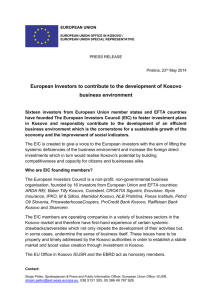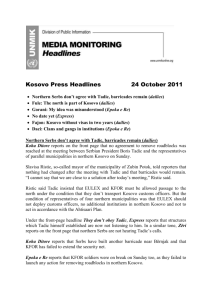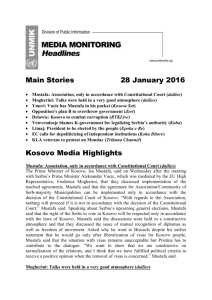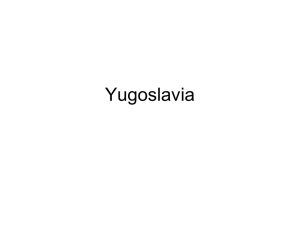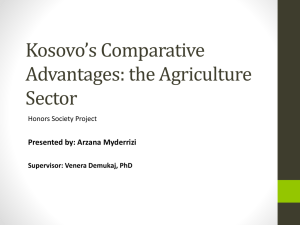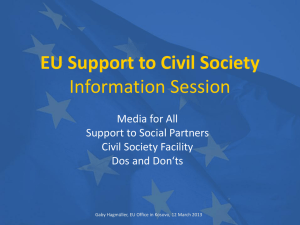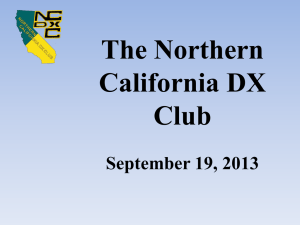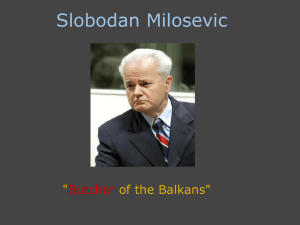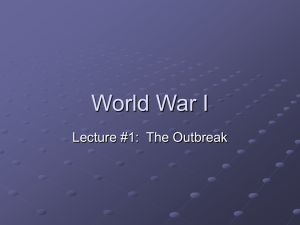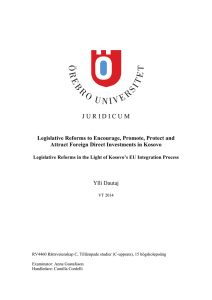of Kosovo - brendanflynn
advertisement
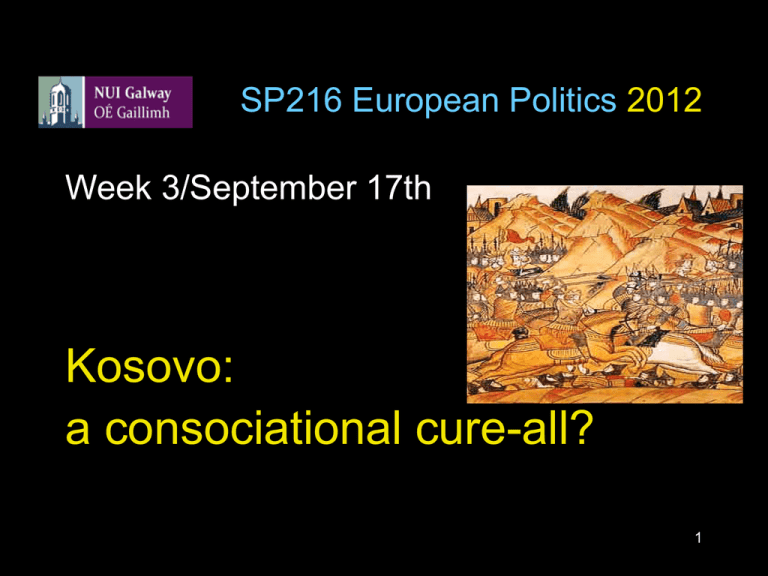
SP216 European Politics 2012 Week 3/September 17th Kosovo: a consociational cure-all? 1 Context I-a look at the Map 2 Context II • • • • • • • Kosovo an important site for ancient Serb nation..myths, religious shrines, etc. long history of Serb-Albanian ethnic conflict and descriminatory policies...1920s...1940s.....1980s..... In fact Kosovo was also a very poor rural backwater of Communist Yugoslavia...today its predominantly ethically Albanian....92% ( historically this was much lower) Today: small population and area: under 2m and about the size of Cork and Limerick counties combined.....or smaller than the US State of Connecticut...... The immediate context is the NATO war in 1999...which liberated Kosovo from the Serbia Milosevic regime...but left an ambiguous entity that was not technically an independent state...in fact in theory it was still part of Serbia (Rump Yugoslavia)...in reality the UN, NATO and EU had to administer it and basically ‘nation build’ from the ground up.... They have chosen to push for an independent Kosovo state that will be consociational (power-sharing) in nature and eventually on track to join EU-NATO? How credible is the process of making Kosovo a type of Belgium of the Balkans when its recent history has been closer to Beirut? 3 Crowds celebrate Kosovo’s declaration of independence (2008). Note they are waving ethnic Albanian flags and not the official ‘neutral flag’ of Kosovo (below) Source: http://www.nytimes.com/slideshow/2008/02/17/world/0217-KOSOVO_index.html 4 As of 2012 Kosovo’s independence is not fully recognized • Majlinda Kelmendi from Kosovo had to field with the Albania team for Women’s Judo in Olympics 2012. Image and full story from: http://www.guardian.co.uk/sport/2012/jul/29/london-2012-judo-majlinda-kelmendi-albania • • • Several EU states refuse to recognize Kosovo-Spain, Greece, Cyprus, Romania, Slovakia! BRICS (Brazil, Russian, India, China, South Africa) do not! Some of these states will not do so because they face secessionist movements and believe Kosovo’s case grants a precedent for legal secession-for other states it a case of domestic politics or close links with Russia and dragging their heals....but they probably will recognize after a period of time...... 2010 International Court of Justice Ruled that the Kosovo declaration of independence was no breech of international law (but on narrow technical grounds). Avoided substantive questions. lack of formal recognition means Kosovo cannot sit in the UN, participate properly in the Olympics or join the EU-its not a trivial issue. • • 5 In fact, it is ‘qualified independence’-EU forces remain (2,000) as do NATO-KFOR (6,000) and Kosovo is heavily dependent on foreign aid. Situation still tense; March 2004, as many as 4,000 Serbs forced to flee orchestrated riots which resulted in “gradual ethnic cleansing” or “de-facto partition”. Serbs being evacuated from riots/pogroms by Albanians in March 2004. From: http://www.esiweb.org/balkanexpress/images/kosovo/kosovo_serbs_fleeing.jpg 6 http://www.youtube.com/watch?v=D9J7gMSeY4E You can also look at: http://www.youtube.com/watch?v=s3734aI2w64&feature=relmfu Attempts by Kosovo to establish Customs posts between Serbia and Kosovo met with considerable violence...Sept 2011.... In some ways the violence was predictable...these are border posts in zones that are de facto Serb enclaves and which the Kosovo govt have had little real control over since 1999...so they were exercising their sovereignty symbolically and also stopping smuggling.....it may also have been a political ‘set-up’ designed to demonstrate to the world that Kosovo needs help or to derail EU-Serbia talks........the Serb militants engaged in the riots were also clearly acting to influence a.forthcoming Serbian general election ...to improve the chances of less moderate Serb nationalists...and make the existing (moderate) Serb government look 7 weak.......in any event it reveals Kosovo is a state that lacks the authority to own and police its borders...and remains dependent on NATO and EU muscle...but for how long? There has been some speculation of a possible ‘re-partioning’ of Kosovo...hand back Serb areas to Kosovo in exchange for ethnic Albania areas...... 8 This would not be easy...nationalist Serbs would find it offensive in terms of giving up the ‘homeland’......also int’l community would be fearful.......of reopening the Kosovo ‘can of worms’....would also ignore the fact that some ethnic Serb enclaves would remain....and these would be even more vulnerable/marginalized....... 9 Kosovo’s day to day governance preceding but beset by international agencies-and their competition-gives Kosovo a semi-Colonial feel? 10 Kosovo under supervision slowly building key state institutions...a multi-ethnic army of sorts and a police force--however ethnic Serb de facto and official recognition or co-operation is limited....... 11 Kosovo part of a bigger game of European ‘High Politics’.......in the Balkans....which is different but reminiscent of 19th century Balkan politics....... Chancellor Merkel lays downs the rules to then Serbian Pres. Boris Tadic for any Serbian entry to the EU in September 2011, Photo from: http://www.unhcr.org/refworld/country,,RFERL,,DEU,,4e5cdbe3c,0.html In August 2011 Merkel visited Belgrade and basically told the Serbs they would have to force the Kosovo Serbs to co-operate....this may offend Serb plans for re-partition....they have to chose ..between either .....Kosovo or the EU...? http://www.bbc.co.uk/news/worldeurope-14631297 We can note how Germany is taking a clear lead in EU policy on the Balkans and ask how representative might their views be of the entire EU? Secondly we might note how stark such choices are-is the EU wise to push states like Serbia into a corner? Greek-Cyprus was allowed join the EU (in 2004) without resolving its dispute with the Turkish held and not commonly recognized North Cyprus state..... Given the EU is in a profound economic/monetary crisis (2008-2012)...many Serbs may well 12 choose to retreat to a rather traditional ‘nationalist’ option.....looking to Russia US involvement through NATO/KFOR remains strong-Kosovo is not just a European problem, but increasingly there is a sense that EU will have to ‘take the baton’ of responsibility (Below massive US military base Camp Bondsteel) 13 Oil and Gas are also a factor in the Balkan region! But Kosovo’s strategic value is not exactly clear given NATO bases in Bulgaria/Romania, etc. 14 Kosovo Related Events 2012-the Link to Serbia and its importance • • • • February 2012 in Northern Kosovo Serb enclaves hold unofficial municipal referendums which rejected Kosovo government authority-further suggesting a partition path? Serbia granted candidate EU member status on March 1st 2012-in theory on track to join within a few years (after a lot of wrangling involving Kosovo and Romania-classic Balkan politics!). Croatia was given the same status in 2004 and is on track to join in 2013.....EU is taking Balkan states in, piecemeal and treating different Balkan states differently........ Serbian Parliamentary and Presidential elections were held in May 2012-and the pro-European Tadic lost....ex-radical nationalists (many with links to the Milosevic regime of the 1990s) were the winners and have formed a Serbian government headed by Pres.Nikolic, that is much closer to Russia, much more intransigent on Kosovo and sees EU membership as less urgent.....its an open question what this means for the future...... See the following Irish Times report: http://www.irishtimes.com/newspaper/world/2012/0912/1224323908632.html In September 2012 the 25 nation International Steering Group declared that Kosovo’s independence was longer under ‘supervision’...in practice NATO and EU will remain involved until 2014.....not much changed on the ground.... 15 Academic focus: can a consociational power-sharing be imposed by external actors (EU & NATO)? • • • • Consociational power-sharing is a common European expedient and has become a core idea among elites.... The Northern Ireland Peace Process is in larger part an apparently successful consociational deal with imposition from semi-external elements (UK, RoI, US govts.) [but note local parties also accepted it and worked with it] One line of argument is to suggest that as a matter of substance consociational power-sharing deals do not work that well because they lead to log-jams, break-downs and are overly complex......some academics have argued that either partition or integrationist strategies are best of resolving post-conflict societies.... a second line of argument is to say that consociationalism may work well in Switzerland where it evolved slowly...BUT it cannot easily be transplanted to less fertile ground like Kosovo or Bosnia (or Cyprus, Moldova, Georgia, etc.). To do so risks imposing a facade of consociationalism...which masks a de facto type of neo-colonial protectorate relationship..... 16 DETOUR: A Consociational model-what does it mean? • The concept is disputed but what it most likely captures is a system of governance where: 1. The population is fundamentally divided by either religion, or language, or both (Austrian an exception-division there is historical/ideological). 2. Often, these sub-cultures are territorially concentrated in distinct areas. 17 Linguistic Map of Switzerland: German (64%; orange); French (19%; green); Italian (8%; purple); Romansh (less than 1%; wine) 18 3. Yet the government is systematically inclusive in representing all (or most) sub-cultures-and sharing power between. Note below how different party political positions are balanced with language identities within the Swiss cabinet 2009 Photo of the Swiss Federal Council (Cabinet) where power is shared in a de facto FOUR party national coalition. Their linguistic affiliation is indicated by flag colours-German, French, Italian speaking. The flag with the horse is the flag of the canton of Graub unden where they speak Romansh. Their party affiliations are below. The lady with the question mark is Eveline Widmer Schlumpf who defected from the SVP in 2007 and was elected with Christian Democrat, Social Democrat and Green votes. This is a highly unusual situation. For more details see: http://en.wikipedia.org/wiki/Swiss_Federal_Council Ueli Maurer Moritz Leunenberger Pascal Couchepin Hans Rudolf Merz Micheline Calmy-Rey Doris Leuthard Eveline Widmer Schlumpf ? Corina Casanova Federal Chancellor/ head of Federal civil service Not a formal voting member of Federal Council 19 4. To achieve this inclusiveness-special political practices or rules are instituted Foremost among these are PR (proportional representation) electoral systems, often with low thresholds to make sure minorities can get ‘their’ parties into Parliament. An example of a Dutch ballot paper-whose PR-List system gives small parties a good chance of making it into parliament-keeping minorities included. Up to 24 parties are listed and the voter can pick an individual candidate they like from a party list-making voting quite complex if your undecided! 20 The Belgian Constitutional Court’s two presidents, Bossuyt (Dutch speaking) on the left and Martens (French speaking) on the right as of 2009 (the Court has six judges from each language group and one of the 12 must be capable of working in German) 5. Proportionality (or an ethnic/linguistic quota) is often used a principle for the sharing of key public offices (Cabinet ministers, army commanders, judges, civil servants, etc.) 21 Switzerland does have federal police forces (these are Federal border guards on the left) but they are relatively small and most policing is done by Cantonal Police Forces (on the right). 7. Where sub-groups are clustered in a given territory they are often given as much local government or decentralized powers as is feasibleconsociationalism often associated with federalism. (However, at that micro-level, the sub-group may be allowed dominate on language or other issues.) 22 Belgian Riot police arrest the leader of the far-right (and secessionist) Vlaams Belang in September 11th, 2007, at a banned anti-Islam rally. Street violence is rare in Belgium-notwithstanding their divisions. 8. There is a low level of violence or disorder between the groups. One of the important unwritten rules is that whatever about the differences between the various divided groups, there is an avoidance of violence. 23 Belgium’s Political elite on parade? The portly man on the right with glasses in Jean Luc Dehaene, a Christian Democrat, and ex-PM and the architect of constitutional reforms of the 1990, sometimes nicknamed the ‘Belgian Plumber’ for his constitutional re-engineering skills. 9. Political elites and parties are vital in consociationalism. They act as negotiators between sub-groups (precisely to avoid mass conflict between ordinary citizens.) 24 It is important you realize that these criteria are ideal types and no state in practice exactly matches this Consociational checklist, but rather they describe the general features of such states, rather more than less. The obvious question can this complex “Swiss Cheese” be applied successfully to Kosovo...or more generally...is it a cure-all? 25 Critique of Consociationalism: Horowitz “In severely divided societies, the recent record of consociational constitutions is, at best, debatable. In Europe, the Belgian regime is fragile, its governing center increasingly hollowed out by efforts to devolve more autonomous powers to its ethnically differentiated regions, in which ethnic outbidding proceeds with little restraint. Bosnia has made little serious progress in conflict amelioration or in reduction in the influence of extremists, and in Northern Ireland, as mentioned, moderates have lost support and extremist parties have flourished. The most that can be said is that, with a few exceptions, violence has been contained.” (Horowitiz, 2007, pp.1221-1222) Horowitz, Donald L. (2007) “Conciliatory institutions and constitutional processes in post-conflict states”, William & Mary Law Review, Vol.49, pp.1213-1248. 26 The Future for Kosovo (and us)-Belgium, Bulgaria, or Syria/Sri Lanka? You need to read the basic reading and at least some of the journals to get a feel for this debate....about Kosovo and the appropriateness of Western/EU intervention to date.....some academics are stressing the de facto partition reality and the fact that Serbs political elites are mostly not co-operating as proof that consociational settlement is not working well-they even suggest partition should be considered. Others are more guarded and point to the complex way Kosovo has been steered towards what is on paper a model consociation, but in practice very much a ‘holding operation’......a key problem is that the peace deal is imposed by external international actors.....what would/can the local want/achieve? 27

